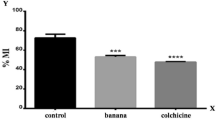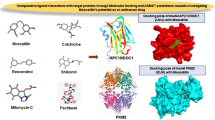Abstract
Monopolar Spindle 1 (MPS1) protein kinases are crucial in metaphase to anaphase cellular transition. It is a primary element of spindle assembly checkpoint (SAC). This SAC is responsible for guarding the proper chromosomal segregation while any chromosomal instability hinders its normal functioning. The chromosomal instability may lead to aneuploidy and tumorigenesis. And it occurs mainly due to overexpression of MPS1 in many cancer types. Their effect could be reduced via MPS1 inhibition. The methanol extract of Pleurotus ostreatus possesses some medicinal qualities and has proven anti-cancerous properties. There is a need for proper screening and identification of molecules that have these anticancer properties and shows affinity against MPS1 with inhibition properties. So for this study, 29 bioactive compounds (handpicked through literature mining) of P. ostreatus were selected to identify a suitable drug candidate. Their ADME/T properties were analyzed, to predict the drug-likeness of mushroom compounds, based on Lipinski’s rule of 5 (RO5). The screening of these bioactive compounds and subsequent molecular docking against MPS1 provided compounds with the best conformation-based binding affinity. The best 2 complexes, i.e., MPS1-ergosterol and MPS1-ganoderic acid, were subjected to the molecular dynamics simulation. Both the complexes were observed for their affinity, stability, and flexibility in protein–ligand complex systems. The MD simulation study reveals that ergosterol has an energetically favorable binding affinity with MPS1. Results show that the formation of a hydrogen bond between Glu603 residue and ergosterol has strengthened the affinity of ergosterol with MPS1. Hence, this study identified ergosterol as a potential and novel inhibitor for MPS1 that could be a plausible drug candidate through this work.
Graphical abstract







Similar content being viewed by others
References
Aier I, Varadwaj P, Raj U (2016) Structural insights into conformational stability of both wild-type and mutant EZH2 receptor. Sci Rep 6:34984. https://doi.org/10.1038/srep34984
Ajith TA, Janardhanan KK (2007) Indian medicinal mushrooms as a source of antioxidant and antitumor agents. J Clin Biochem Nutr 40:157–162
Alimova I, Ng J, Harris P (2016) MPS1 kinase as a potential therapeutic target in medulloblastoma. Oncol Rep 36(5):2633–2640. https://doi.org/10.3892/or.2016.5085
Bobek P, Galbavy S (1999) Hypocholesterolemic and antiatherogenic effect of oyster mushroom (Pleurotus ostreatus) in rabbits. Nahrung 43:339–342
Bobek P, Ozdin L, Kuniak L (1995) Antioxidative effect of oyster mushroom (Pleurotus ostreatus) in hypercholesterolemic rat. Pharmazie 50:441–442
Bowers KJ, Edmond C, Huafeng X, Ron OD, Michael P, Eastwood BA. Gregersen JL, Klepeis, IK, Mark AM, Federico D, Sacerdoti JK, Salmon YS, David ES (2006) Scalable algorithms for molecular dynamics simulations on commodity clusters. In: Proceedings of the ACM/IEEE Conference on Supercomputing (SC06)
Cao X, Liu J, Yang W, Hou X, Li Q (2015) Anti-tumor activity of polysaccharide extracted from Pleurotus ostreatus mycelia against gastric cancer in vitro and in vivo. Mol Med Rep 12(2):2383–2389
Choi M, Min YH, Pyo J, Lee CW, Jang CY, Kim JE (2017) TC Mps1 12, a novel Mps1 inhibitor, suppresses the growth of hepatocellular carcinoma cells via the accumulation of chromosomal instability. Br J Pharmacol 174(12):1810–1825. https://doi.org/10.1111/bph.13782
Daniel J, Coulter J, Woo JH, Wilsbach K, Gabrielson E (2011) High levels of the Mps1 checkpoint protein are protective of aneuploidy in breast cancer cells. Proc Natl Acad Sci USA 108(13):5384–5389. https://doi.org/10.1073/pnas.1007645108
Ebrahimi A, Atashi A, Soleimani M, Mashhadikhan M, Barahimi A, Kaviani S (2018) Comparison of anticancer effect of Pleurotus ostreatus extract with doxorubicin hydrochloride alone and plus thermotherapy on erythroleukemia cell line. J Complement Integr Med 15(2):20160136. https://doi.org/10.1515/jcim-2016-0136
Facchini JM, Alves EP, Aguilera C (2014) Antitumor activity of Pleurotus ostreatus polysaccharide fractions on Ehrlich tumor and Sarcoma. Int J Biol Macromol 68:72–77
Gu Y-H, Jessica L (2006) In vitro effects on proliferation, apoptosis and colony inhibition in ER-dependent and ER-independent human breast cancer cells by selected mushroom species. Oncol Rep 15(2):417–423
Guan L, Yang H, Cai Y, Sun L, Di P, Li W, Liu G, Tang Y (2018) ADMET-score - a comprehensive scoring function for evaluation of chemical drug-likeness. MedChemComm 10(1):148–157. https://doi.org/10.1039/c8md00472b
Holland AJ, Cleveland DW (2009) Boveri revisited: chromosomal instability, aneuploidy and tumorigenesis. Nat Rev Mol Cell Biol 10(7):478–487. https://doi.org/10.1038/nrm2718
Innocenti P, Woodward HL, Solanki S, Naud S, Westwood IM, Cronin N, Hayes A, Roberts J, Henley AT, Baker R, Faisal A, Mak GW, Box G, Valenti M, De Haven BA, O’Fee L, Saville H, Schmitt J, Matijssen B, Burke R, van Montfort RL, Raynaud FI, Eccles SA, Linardopoulos S, Blagg J, Hoelder S (2016) Rapid discovery of pyrido[3,4-d]pyrimidine inhibitors of Monopolar Spindle Kinase 1 (MPS1) using a structure-based hybridization approach. J Med Chem 59(8):3671–3688. https://doi.org/10.1021/acs.jmedchem.5b01811
Iwase T et al (1993) Identification of protein-tyrosine kinase genes preferentially expressed in embryo stomach and gastric cancer. Biochem Biophys Res Commun 194(2):698–705. https://doi.org/10.1006/bbrc.1993.1878
Jedinak A, Sliva D (2008) Pleurotus ostreatus inhibits proliferation of human breast and colon cancer cells through p53-dependent as well as p53-independent pathway. Int J Oncol 33(6):1307–1313
Katara P (2013) Role of bioinformatics and pharmacogenomics in drug discovery and development process. Netw Model Anal Health Inform Bioinform 2(4):225–230. https://doi.org/10.1007/s13721-013-0039-5
Kesharwani A, Chaurasia DK, Katara P (2021) Repurposing of FDA approved drugs and their validation against potential drug targets for Salmonella enterica through molecular dynamics simulation. J Biomol Struct Dyn. https://doi.org/10.1080/07391102.2021.1880482
Ling Y, Zhang X, Bai Y, Li P, Wei C, Song T, Zheng Z, Guan K, Zhang Y, Zhang B, Liu X, Ma RZ, Cao C, Zhong H, Xu Q (2014) Overexpression of Mps1 in colon cancer cells attenuates the spindle assembly checkpoint and increases aneuploidy. Biochem Biophys Res Commun 450(4):1690–1695. https://doi.org/10.1016/j.bbrc.2014.07.071
Liu X, Winey M (2012) The MPS1 family of protein kinases. Annu Rev Biochem 81:561–585. https://doi.org/10.1146/annurev-biochem-061611-090435
Lobanov MIu, Bogatyreva NS, Galzitskaia OV (2008) Radius of gyration is indicator of compactness of protein structure. Mol Biol (mosk) 42(4):701–706
Lu S, He X, Yang Z, Chai Z, Zhou S, Wang J, Zhang J (2021) Activation pathway of a G protein-coupled receptor uncovers conformational intermediates as targets for allosteric drug design. Nature Commun 12(1):1–15
Mason JM, Wei X, Fletcher GC, Kiarash R, Brokx RD, Hodgson RJ, Beletskaya IO, Bray MR, Mak TW (2017) Functional characterization of CFI-402257, a potent and selective Mps1/TTK kinase inhibitor, for the treatment of cancer. Proc Natl Acad Sci 114:3127–3132
Morris GM, Huey R, Lindstrom W, Sanner MF, Belew RK, Goodsell DS, Olson AJ (2009) Autodock4 and AutoDockTools4: automated docking with selective receptor flexiblity. J Computat Chem 16:2785–2791
Musacchio A, Salmon E (2007) The spindle-assembly checkpoint in space and time. Nat Rev Mol Cell Biol 8:379–393. https://doi.org/10.1038/nrm2163
Pandey S, Dhusia K, Katara P, Singh S, Gautam B (2020) An in-silico analysis of deleterious single nucleotide polymorphisms and molecular dynamics simulation of disease linked mutations in genes responsible for neurodegenerative disorder. J Biomol Struct Dyn 38(14):4259–4272. https://doi.org/10.1080/07391102.2019.1682047
Rajewska J, Balasinska B (2004) Biologically active compounds of edible mushrooms and their beneficial impact on health. Postepy Hig Med Dosw 58:352–357
Ramos M (2019) Agaricus bisporus and its by-products as a source of valuable extracts and bioactive compounds. Food Chem 292:176–187. https://doi.org/10.1016/j.foodchem.2019.04.035
Sarangi I, Ghosh D, Bhutia SK, Mallick SK, Maiti TK (2006) Anti-tumor and immunomodulating effects of Pleurotus ostreatus mycelia-derived proteoglycans. Int Immunopharmacol 6:1287–1297
Sliva D (2008) Phellinus linteus suppresses growth, angiogenesis and invasive behaviour of breast cancer cells through the inhibition of AKT signalling. Br J Cancer 98(8):1348–1356. https://doi.org/10.1038/sj.bjc.6604319
Tong H, Xia F, Feng K (2009) Structural characterization and in vitro antitumor activity of a novel polysaccharide isolated from the fruiting bodies of Pleurotus ostreatus. Bioresour Technol 100:1682–1686
Trott O, Olson AJ (2010) AutoDock Vina: improving the speed and accuracy of docking with a new scoring function, efficient optimization, and multithreading. J Comput Chem 31(2):455–461. https://doi.org/10.1002/jcc.21334
Wang X, Zhang H, Chen X (2019) Drug resistance and combating drug resistance in cancer. Cancer Drug Resist 2(2):141
Xia X (2017) Bioinformatics and drug discovery. Curr Top Med Chem 17(15):1709–1726
Xing C (2021) Studies of Interaction Mechanism between Pyrido [3,4-d] Pyrimidine Inhibitors and Mps1. Molecules (basel, Switzerland) 26(16):5075. https://doi.org/10.3390/molecules26165075
Acknowledgements
The authors are grateful to the Centre of Bioinformatics and Centre of Biotechnology, University of Allahabad for providing the access to the resources that were required to carry out this research work.
Funding
The authors received no funding for this work.
Author information
Authors and Affiliations
Corresponding authors
Ethics declarations
Conflict of interest
The authors declare that they have no competing interests.
Ethical approval and consent to participate
Not applicable.
Consent for publication
Not applicable.
Supplementary Information
Below is the link to the electronic supplementary material.
Rights and permissions
About this article
Cite this article
Mishra, D., Mishra, A., Katara, P. et al. In silico identification of potential inhibitors of MPS1 from edible mushroom (Pleurotus ostreatus) to prevent aneuploidy and tumorigenesis. J Proteins Proteom 13, 175–185 (2022). https://doi.org/10.1007/s42485-022-00091-4
Received:
Revised:
Accepted:
Published:
Issue Date:
DOI: https://doi.org/10.1007/s42485-022-00091-4




